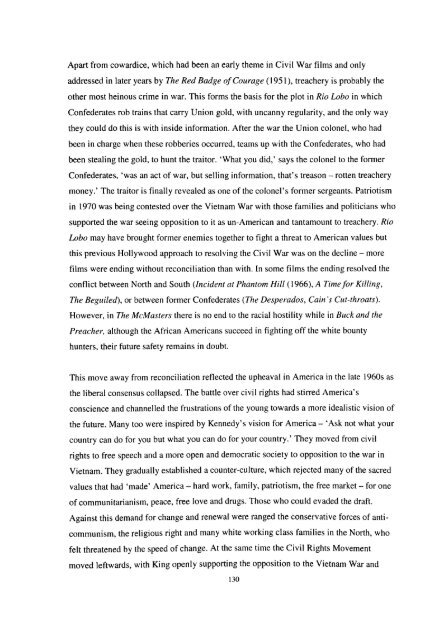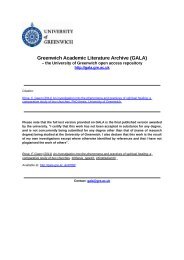Download (3483kB) - Greenwich Academic Literature Archive ...
Download (3483kB) - Greenwich Academic Literature Archive ...
Download (3483kB) - Greenwich Academic Literature Archive ...
- No tags were found...
Create successful ePaper yourself
Turn your PDF publications into a flip-book with our unique Google optimized e-Paper software.
Apart from cowardice, which had been an early theme in Civil War films and onlyaddressed in later years by The Red Badge of Courage (1951), treachery is probably theother most heinous crime in war. This forms the basis for the plot in Rio Lobo in whichConfederates rob trains that carry Union gold, with uncanny regularity, and the only waythey could do this is with inside information. After the war the Union colonel, who hadbeen in charge when these robberies occurred, teams up with the Confederates, who hadbeen stealing the gold, to hunt the traitor. 'What you did,' says the colonel to the formerConfederates, 'was an act of war, but selling information, that's treason - rotten treacherymoney.' The traitor is finally revealed as one of the colonel's former sergeants. Patriotismin 1970 was being contested over the Vietnam War with those families and politicians whosupported the war seeing opposition to it as un-American and tantamount to treachery. RioLobo may have brought former enemies together to fight a threat to American values butthis previous Hollywood approach to resolving the Civil War was on the decline - morefilms were ending without reconciliation than with. In some films the ending resolved theconflict between North and South (Incident at Phantom Hill (1966), A Time for Killing,The Beguiled}, or between former Confederates (The Desperados, Cain's Cut-throats).However, in The McMasters there is no end to the racial hostility while in Buck and thePreacher, although the African Americans succeed in fighting off the white bountyhunters, their future safety remains in doubt.This move away from reconciliation reflected the upheaval in America in the late 1960s asthe liberal consensus collapsed. The battle over civil rights had stirred America'sconscience and channelled the frustrations of the young towards a more idealistic vision ofthe future. Many too were inspired by Kennedy's vision for America - 'Ask not what yourcountry can do for you but what you can do for your country.' They moved from civilrights to free speech and a more open and democratic society to opposition to the war inVietnam. They gradually established a counter-culture, which rejected many of the sacredvalues that had 'made' America - hard work, family, patriotism, the free market - for oneof communitarianism, peace, free love and drugs. Those who could evaded the draft.Against this demand for change and renewal were ranged the conservative forces of anti-communism, the religious right and many white working class families in the North, whofelt threatened by the speed of change. At the same time the Civil Rights Movementmoved leftwards, with King openly supporting the opposition to the Vietnam War and130
















